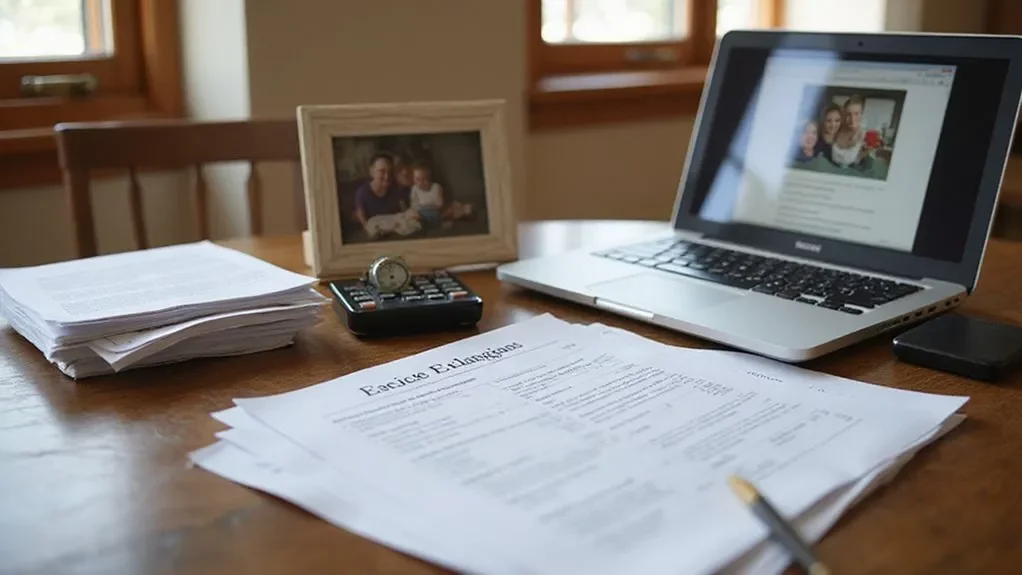Drowning in a sea of paperwork while grieving seems like the cruelest joke life can play. Selling your parent’s home after their passing involves complex legal hurdles, confusing tax implications, and emotional challenges. Most families struggle with where to begin or how to handle these overwhelming responsibilities during a time of loss. Following a structured approach can transform this daunting process into manageable steps.
When selling a parent’s home after death, you must first wait for probate completion or for the executor to gain legal authority. The executor will then manage the entire sales process, handling all paperwork and ensuring legal compliance while considering tax implications like capital gains.
The home may need preparation before listing, or you might consider selling as-is to expedite matters. Throughout this blog I will explore everything you need to know about selling a deceased parent’s home.
Key Takeaways
- Wait for probate completion and legal authority before selling the inherited home.
- Executor or court approval is required; all heirs may need to agree on the sale.
- Be aware of tax implications like capital gains and inheritance taxes, and consult a CPA.
- Properly prepare the home with cleaning, repairs, and staging to maximize value.
- Consider selling options such as traditional listing, cash buyers, or auctions for a quicker sale.
When Should You Sell a Parent’s Home After Death?

When Should You Sell a Parent’s Home After Death?
You should wait until probate completes or an executor has legal authority. Estate laws require proper documentation before selling inherited property. This approach prevents legal complications later.
Family members need time to process their grief. Consider emotional readiness and consensus among heirs. The home may hold sentimental value for everyone involved.
Meanwhile, ongoing costs continue to accumulate. Property taxes, insurance, and maintenance expenses don’t pause during this period.
Therefore, balancing emotional needs with financial realities becomes important.
An estate attorney can provide guidance specific to your situation. Their expertise helps navigate complex inheritance issues and timing decisions.
Who Has Legal Rights to Sell the Parent’s House?

The right to sell your parent’s home usually belongs to the executor or court-appointed administrator, who manages the estate’s affairs.
If there are multiple heirs, they must agree on the sale unless the will or court assigns authority to one person.
Keep in mind that a power of attorney ends at death, so only the designated estate representative can act moving forward.
Executor or Administrator Authority
The executor or administrator has legal authority to sell a deceased parent’s house in Kansas City. Executors are named in wills, while administrators are appointed by courts when no will exists.
These authorized individuals must follow probate court requirements and maintain proper documentation throughout the process.
Your duties include gathering essential legal documents and managing the property until sale completion.
Court approval may be necessary before you can proceed with selling the property. This requirement varies based on local probate laws.
Furthermore, you must act in the estate’s best interest when making decisions about the property sale. All beneficiaries should receive regular updates about your actions and intentions.
Multiple Heirs and Decision Making
The executor named in the will has the legal right to sell a deceased parent’s house when multiple heirs exist. This person manages the entire sales process on behalf of all beneficiaries.
If no will exists, the court appoints an administrator to handle the property disposition.
Unanimous consent among heirs is typically required for the sale to proceed. This prevents potential legal challenges later. The executor must document all decisions carefully. For a smooth process, heirs should clarify ownership status immediately after death.
Legal guidance helps navigate potential disputes between family members. Professional advice also ensures compliance with inheritance laws. Additionally, a neutral third party can facilitate difficult conversations.
Power of Attorney Limitations
A Power of Attorney ends immediately when the principal dies. The agent can’t sell the deceased’s home or manage their estate after death.
Only the executor or court-appointed administrator has legal authority to sell property after someone passes away.
This limitation exists because a POA is designed to function only while the principal is alive. The agent’s powers terminate at the moment of death.
After this point, the estate enters probate. Property transfers must then follow proper legal channels.
The family should consult with an estate attorney to understand next steps. Many people mistakenly believe a POA continues after death, but this is incorrect.
How to Handle the Probate Process When Selling?

To handle the probate process when selling your parent’s home, you need to understand the legal requirements and ensure proper court procedures are followed.
You might investigate expedited probate options or consider selling the property before probate is fully completed if allowed by law.
Staying informed and working with professionals can streamline the sale and help avoid delays.
Understanding Probate Requirements
Probate is required to legally sell a deceased parent’s home. You must file a court petition with the death certificate, will, and asset inventory. State laws determine exact requirements and timelines for property transfers.
The court validates the will and grants authority to the executor. This legal process protects all parties involved.
Property can’t be sold until probate concludes. The executor handles the sale according to will instructions or court directions.
Most estates complete probate within 6-9 months, depending on complexity. Furthermore, working with an estate attorney simplifies these proceedings.
Expedited Probate Options
New Jersey offers three main ways to speed up property transfers after a parent’s death.
Simplified Probate works for small estates under certain value limits. The Transfer on Death deed lets homeowners name beneficiaries before they pass away.
Small Estate Affidavits can be used when the total estate value falls below New Jersey’s legal threshold.
These options help heirs avoid lengthy court processes. Each method has specific requirements based on estate size and planning.
Furthermore, the right choice depends on your parent’s preparation before death. Consulting with a probate attorney ensures you select the most appropriate path for your situation.
Selling Before Probate Completion
Yes, you can sell a property before probate ends with court approval. The executor needs legal authority to list and sell the inherited home.
Court permission must be secured before finalizing any sale during probate. An estate attorney should guide this process. They help ensure all legal requirements are met.
The sale proceeds must address outstanding debts first. Furthermore, all beneficiaries’ interests require protection throughout the transaction.
The probate court supervises these sales to prevent issues. In essence, proper legal channels make selling before probate completion possible yet carefully regulated.
What Financial Implications Should You Consider?
When selling your parents’ home, you need to consider tax implications like capital gains and inheritance taxes, which can significantly impact your net proceeds.
You should also account for any remaining mortgage or debts tied to the property, as well as estate expenses that could reduce what’s available for distribution.
Being aware of these financial factors helps you plan effectively and avoid unexpected costs.
Capital Gains Tax Considerations
Inherited homes in Kansas City have specific tax advantages. The “stepped-up basis” rule resets the property value to its worth at the time of inheritance. This typically reduces your taxable gain significantly when selling.
Capital gains tax only applies if you sell for more than the stepped-up basis value.
No taxes are due when selling below this appraised value. A home appraisal at inheritance time establishes this crucial baseline. For example, if your inherited home was worth $200,000-$500,000, you owe nothing in capital gains tax.
Tax rates vary based on your income level and how long you’ve owned the property. Therefore, consulting a CPA before selling is essential.
Inheritance Tax Responsibilities
Inheriting property creates potential tax obligations based on your location and relationship to the deceased.
Some states like New Jersey charge inheritance tax rates up to 16% depending on your familial connection. You may face different tax burdens if you’re a direct descendant versus a distant relative.
Life insurance proceeds typically remain tax-exempt. However, total estate value might trigger additional taxes when exceeding certain thresholds.
For instance, federal estate taxes apply only to very large inheritances. To minimize financial impact, consult with a tax professional familiar with your state’s specific inheritance laws.
Mortgage and Debt Settlement
You must settle all debts before transferring an inherited home. The mortgage needs full payment to prevent foreclosure. Estate assets typically cover existing property liens. Property taxes and other debts require attention as well.
The estate’s executor is legally responsible for ensuring all debts are resolved before distribution to beneficiaries.
Professional guidance helps navigate potential capital gains tax implications. A financial advisor can recommend appropriate debt settlement strategies.
Consider estate liquidation when debts exceed available cash resources. This approach protects heirs from assuming unwanted financial burdens.
Furthermore, prompt debt resolution prevents additional interest accumulation.
Estate Expense Management
Managing a deceased parent’s estate involves specific financial obligations. You must pay ongoing expenses like mortgage, taxes, and utilities while the property remains in probate.
Property value is determined through a time-of-death appraisal, which establishes the stepped-up basis for capital gains tax calculations. This valuation often benefits heirs by minimizing tax burden.
Additionally, estate funds typically cover these expenses until settlement. If funds are insufficient, heirs may need to contribute temporarily.
How to Prepare the House for a Quick Sale?
To sell the home quickly, start with essential cleaning and repairs to boost its appeal.
Clear out personal belongings and organize documents to enable smooth transactions.
Stage the property simply and ensure all utilities work, so it presents well to possible buyers.
Essential Cleaning and Repairs
A clean, well-maintained home sells faster and for more money. Fix all safety and functionality issues first. Focus on plumbing leaks, electrical problems, and structural concerns.
Replace broken windows and repair damaged flooring. Deep clean every room thoroughly. Shampoo carpets, wash windows, and sanitize all appliances until they sparkle.
Moreover, consider simple cosmetic updates to modernize your home. Fresh paint in neutral colors can provide a 100% return on investment. New fixtures in kitchens and bathrooms also appeal to buyers. As a result, these improvements will significantly increase your home’s marketability.
Personal Property Management
Remove personal items before listing your home for sale. This step helps buyers envision themselves in the space. Start by sorting belongings into four categories: keep, donate, sell, or discard.
The average home sale with proper decluttering sells 15-30 days faster than cluttered properties.
Professional estate services can handle this task if you feel overwhelmed. These experts work efficiently while respecting sentimental items.
For better results, begin this process at least two weeks before listing your home.
Additionally, consider temporary storage options for items you want to keep but need to remove.
Home Staging Basics
Effective home staging helps sell your property faster. Start by decluttering your home completely. Remove personal items and organize remaining belongings to showcase space. Consider hiring clean-out services for major decluttering projects.
Next, address all minor repairs throughout the house. Patch any holes in walls, fix leaky faucets, and repaint rooms in neutral colors. These simple fixes significantly improve buyer perception.
Finally, deep clean everything until it shines. Pay special attention to carpets, windows, and bathrooms. A pristine home creates positive first impressions.
Furthermore, thorough cleaning prevents potential issues during the inspection process.
Documentation Organization
Organize all necessary property documents early to avoid delays. Gather the death certificate, homeowner’s insurance, mortgage statements, and liens promptly. This preparation helps the sale process move smoothly and prevents complications later. The most critical documents include legal proof of death and property ownership.
For best results, create a filing system using the categories in the table below. Estate sales require specific paperwork based on state laws and property circumstances. Check each document’s status regularly and note any missing items that need attention.
| Document Type | Purpose | Status |
|---|---|---|
| Death Certificate | Confirm legal authority | Obtained/In progress |
| Mortgage Statements | Clear outstanding debts | Verified/Pending |
| Insurance Policy | Ensure coverage details | Located/Not found |
| Liens | Resolve claims before sale | Pending/Resolved |
What Are Your Options for Selling the Property?
You have several options for selling your parents’ home, each with its pros and cons.
You can list the property traditionally, sell to a cash buyer for speed, handle an owner sale yourself, or consider an auction for a quick sale.
Choosing the right approach depends on your timeline, financial goals, and the property’s condition.
Traditional Real Estate Listing
Traditional real estate listing offers a reliable path for selling a deceased parent’s home. A qualified agent determines fair market value and creates effective marketing strategies. They handle paperwork and negotiations while you focus on other matters.
List your property on multiple platforms to reach more potential buyers. The home should be staged and necessary repairs completed before showings begin. This approach typically requires patience.
Most traditional sales take 2-3 months from listing to closing. During this period, you may receive offers requiring negotiation. However, this method often yields the highest possible sale price.
Cash Home Buyer Advantages
Cash buyers make estate sales faster and easier. They purchase homes “As-Is” with no repair requirements. The entire transaction can complete in about seven days. This speed eliminates the stress of lengthy traditional sales.
Cash purchases involve fewer contingencies and no mortgage approval delays. Money transfers quickly to settle the estate. Your family can move forward sooner with closure.
For many heirs, this efficient approach provides relief during a difficult time. The simplified process requires minimal paperwork and hassle. You can focus on honoring your parent’s memory instead of property concerns.
For Sale By Owner Approach
Selling your home without an agent can save you thousands in commission fees. This approach gives you complete control over the selling process. You’ll need to handle all aspects yourself, from pricing to negotiation.
Accurate pricing requires a competitive market analysis of similar homes in your area. Photos make a crucial difference in attracting potential buyers.
Professional pictures will showcase your property’s best features. Additionally, learn your legal obligations before proceeding. Local real estate laws vary by state and municipality. Furthermore, you’ll need to prepare all paperwork and disclosures properly.
Auction Possibilities
Auctions offer a quick way to sell inherited property when you need fast results. You can set a reserve price to protect your interests while attracting competitive bids. This option works well for estates that need prompt settlement.
Many auction houses specialize in property sales and can market to motivated buyers. Auction fees typically range from 5-10% of the final sale price. Before choosing this path, consider property condition and local market demand.
The auction process eliminates lengthy negotiations and typically closes within 30-45 days. However, buyers often expect discounts at auctions.
Proper staging and preparation remain crucial for maximizing your sale value despite the accelerated timeline.
How Can Selling to a Cash Buyer Help During Grief?
Selling to a cash buyer simplifies the process, helping you avoid lengthy negotiations and reduce stress during a difficult time.
You won’t need to prepare the home for showings or handle repairs, easing emotional strain.
With a quick closing process, you get immediate financial relief, so you can focus on healing.
Streamlined Process Benefits
Cash buyers simplify estate settlement after a parent’s death. They purchase homes quickly, often within days instead of months. You can focus on healing while the sale progresses smoothly.
No repairs or inspections are necessary with cash buyers. This eliminates pre-sale preparation and reduces your workload during an already stressful time. The property sells in as-is condition without added expenses.
Most cash transactions close within 7-14 days compared to 30-60 days with traditional buyers. Financial strain decreases with faster access to funds.
The process involves fewer parties, creating a more dependable timeline with minimal complications.
Avoiding Emotional Showings
Limit property viewings when selling a parent’s home during grief. Opt for cash buyers who typically require only one viewing before making an offer. This approach reduces emotional stress for family members still processing their loss.
You won’t need to stage the home or maintain it for multiple showings. Cash sales also minimize family disagreements about pricing and property condition.
The quick closing process provides immediate funds that can help with estate settlement. Most cash transactions complete within 7-14 days compared to 30-45 days for traditional sales.
Your privacy remains protected during this vulnerable time. Many cash buyers handle paperwork remotely with minimal disruption to your family.
Quick Closing Timeline
Cash buyers typically close in 7-14 days versus 30-60 days for traditional sales. This speed helps families settle estates faster after losing a loved one.
You won’t face mortgage approval delays with cash transactions. The process also requires fewer inspections and repairs, reducing emotional strain during grief.
For many families, this streamlined approach provides welcome relief.
A financial advisor can verify this quick timeline aligns with your specific needs. Their guidance ensures you make sound decisions while navigating a difficult time.
As-Is Purchase Advantage
Selling to cash buyers means they purchase homes in their current condition. This eliminates the need for repairs or updates before selling. You won’t spend money fixing issues that inspectors might find. Your parent’s home sells exactly as it stands today.
The process simplifies an emotionally difficult transition during inheritance.
Most as-is cash transactions close within 7-14 days compared to traditional sales. Furthermore, you avoid staging, open houses, and multiple showings.
This approach provides both financial and emotional relief. The straightforward process lets you focus on family matters instead of property concerns.
Ready to Sell Your Parent’s Home? Contact Limitless Homes of KC Today
We can help you sell your parent’s home with minimal stress. Our experts guide you through every step, from title transfers to probate requirements.
Family home sales require specific legal documentation and often face unique tax implications. We handle all paperwork while you focus on your family’s needs.
Our team accurately evaluates property value and manages the entire selling process.
Furthermore, we coordinate all closing details. The emotional aspects of selling a family home matter to us.
Contact Limitless Homes of KC today for compassionate, professional assistance tailored to your situation.
Frequently Asked Questions
How Long Do You Have to Sell a House After Someone Dies?
You should aim to sell the house within 6 to 12 months after death to minimize costs and complications. Act promptly to settle debts, handle legal matters, and avoid significant disputes or property deterioration, ensuring a smoother transfer for heirs.
Do I Have to Pay Taxes on the Sale of My Deceased Mother’s House?
If you sell your deceased mother’s house, you generally won’t owe capital gains tax if sold at the stepped-up basis value. For example, in a case, selling at market value avoids additional taxes; consult a tax professional.
How Do You Sell a Deceased Person’s House?
You identify the executor or court-appointed administrator, gather legal documents, settle debts, and obtain court approval if needed. Then, prepare the home, hire an agent, and sell following legal procedures to serve the estate efficiently.

